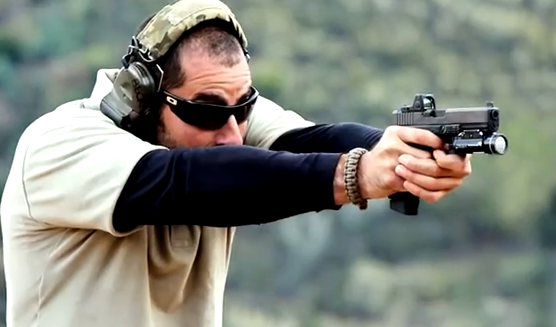In certain circles, it’s become kind of cool to pooh-pooh a type of firearms training class referred to as “operator fantasy camps.” You know the type of class I’m talking about, it’s full of accountants, plumbers, and mechanics dressed in MOLLE with plate carriers doing carbine drills that have basically zero application to civilian self-defense. Now, some of these classes are doing things that are legitimately dangerous, whether it’s through lax safety standards or running drills that are dangerous when combined with unskilled students. However, if an operator fantasy camp class isn’t doing anything unsafe, what’s the big deal?

Right now, someone is pushing their taped glasses up the bridge of their nose as he prepares to blast with me a comment about how I’ve been one of the people making fun of these fantasy camps. Yeah, he’d be right. I have in the past, and although I’d like to think that I’ve restricted my commentary to mocking safety violations, that’s probably not true. But what I’ve come around to realizing is that so long as the class is being safe, there’s literally no difference between taking a 1,000 round tactical carbine class or spending all your time learning to load your 3-gun shotgun better. Because as long as you, the person spending the money, buying the ammo and putting in the time are having fun, who cares? Sure, some tactards are going to mock USPSA shooters for being gamers running silly gear, and USPSA shooters are going to mock tactical dudes for being…overly tactical, but really what does it matter? It’s all fantasy anyway.
I mean, we live in a country where you can pay people real American cash money to pretend to be a fighter pilot, a race car driver, or a football player. So it makes perfect sense that we have camps set up where people can pretend to be a Navy SEAL, or at least train like a Navy SEAL. Like I said, it’s all fantasy anyway, and there isn’t anything wrong with that.
Here’s a word of caution, however. Know the training you’re signing up for. If you’re looking for a class to teach you the fundamentals of operating a carbine for home and self-defense, you probably don’t need to spend time rolling around in the dirt, breaching doors, and stacking up with 4 or 5 strangers. But maybe you’ve been taking classes and you’re kind of tired of the same old same old; you want to have some fun and you want to feel high speed. It’s no different than an auto enthusiast signing up to take a NASCAR Experience class or something like that. You go hard, you do stuff you wouldn’t get to do otherwise, and everyone has a good time.
Go have a good time. Be safe, keep training, yeeha.

Here is the difference, one is an exercise in self-delusion the other is not.
When I spend 4 hours trying to perfect dropping quadloads, I’m under no illusion that I’m doing anything remotely real life practical. I get better at my game (hopefully). I can measure how much better I get at my game by competing against others. When I go out and test myself, against others, I never walk away with a false sense of my skill set. In fact more often then not it is an extremely humbling experience. I mostly get to find out exactly how much I suck.
When someone goes to a operator fantasy camp, most are under the impression they ARE doing something practical. Most don’t think it’s game. They walk away with false assessment of their own skillset, with no real reality checks.
If operator fantasy camps were marketed as a theme parky “Come out and have fun!”. I would agree with you, but they aren’t. They are marketed as serious training for serious timmy’s. They are marketed to be the place to turn your pudgy sedentary ass into a door kicking, face shooting ninja warrior.
I think that right there is the big difference.
No one walks away from the nascar experience thinking they are race driver.
+1 Greg B
What the competitor does is declared not real, even though he actually does it.
What the tactical timmy does is declared as real, even though he actually doesn’t.
I think we’ve missed the biggest point in this whole thing! Taking a class (basically any class) you’ve done your homework on and considered before signing up… Pretty much puts the students in the top 2-3% (max that’s an eyeballed figure). What I mean here is A LOT of people in this country own guns (something like 60-100 million depending on who’s numbers you use). Some of the people who own guns actually shoot regularly (eyeballing again maybe 10%). Of the people who own guns fairly few people actually take any classes including permit to carry (maybe 3%). So just about no one ever takes a class requiring prerequisites, travel or a big round count/price tag!
My point here is even if we might not get it perhaps it’s good they’re trying to do something.
I’m having a moment here.
There’s another group of guys (3 of them so far) signed up for this weekend’s “Introduction to USPSA”, which is billed as a “Safety Class” (and it is).
Every class has people of various levels of expertise; I know that some of them have been shooting for years, because I ask them all about their experience level as soon as the class starts.
Most sign up for the class because they’s seen, or someone has told them about, USPSA competition and they think it looks interesting.
When we actually get into the “Range Time” portion of the class, they often discover that every thing they thought they knew about gun-handling was either wrong (as in “not safe”) or contraindicated (as in “not good practice”).
Some of them don’t know how to hold a pistol; I show them that if they put their left thumb over their right wrist, the slide will come back and break their thumb. “Nobody ever told me this!” Those people never go to a match because they’ve just realized that this shit is not for them.
In fact, 30% of the people never actually attend a single match.
Of those that DO attend one match, 10% break a safety rule and are disqualified … only 10% of THOSE people ever attend another match, and eventually are certified because they shot a match safely.
Still, every time I go to a match, I find that between 40% and 50% of the competitors are people who have completed the training class, and they are active in the sport. Several of the club officers have taken this class!
Training achieves three objectives:
1: Training provides the basis for skill sets which MAY be applicable to the goal (here, USPSA competition) but ALSO improves their safety in both competitive and social environments;
2: Training sorts out those who have deluded themselves into thinking that they are “as good as anybody” with a gun in their hand .. but are not. These folks rarely seek training; usually, they just disappear.
3. Training separates out those who are intelligent enough, responsible enough, and reasonable enough to realize that they have learned things about themselves that they would not have learned elsewhere. These are the top 10%, and they are our leaders for tomorrow.
It’s easy to denigrate training in gun-handling skills, whether it’s USPSA or IDPA or IROC or “Operator Fantasy” style training (I’ve never attended those kind of training because I already know more than I want to about combat).
But when you think about it, playing games is what we do our whole life. And often, your ability to accept training and apply those learned skills to something OTHER than shooting at targets provides confidence to accept leadership roles further down the road.
There are no down-sides to “training”. It not only builds skill-sets, but separates the wheat from the chaff.